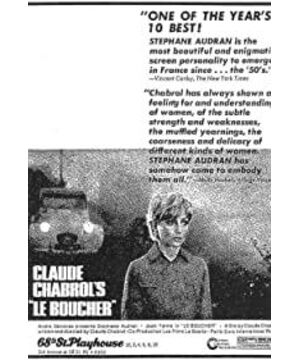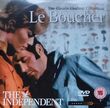Excerptions from Jonathan York's "Awaiting Oblivion: Decolonization and Deterritorialization" (2014):
Le Boucher reveals the real of the fictive: the real of memories edited and revised; the real that unfolds in the process of unrealing. The wars of independence may have made Popaul a butcher; but butchering became his metier (occupation) only upon his return to a defamiliarized provincial milieu. Even the conventional patterns of courtship in the provinces have altered. Popaul's homicidal turn is not a pathological reprisal of atrocities committed by a demobilized torturer. He dispatches his victims with a butcher knife, a weapon much too intimate and unclean for the assembly0line executant in North Africa. His frustrating relationship with the avatar of the "new woman" (educated, sophisticated, self-confident, staunchly independent) will unleash a misogynist violence latent in his masculine identity-formation.the dilemma in Le Boucher arises from engendered alterations in the hexagon problematized by the emasculating experience of France's fall from great-power status. Helene disrupts the conventional trajectory of courtship, consigning Popaul to the role of "gatherer" (mushrooming). She presents this latter-day caveman with a lighter-- the gift of fire; and a surrogate, for the flush of flesh in coitus. The open spaces of the countryside and village gradually recede, reducing the mobility of both parties in a centripetal ebb that subsides in Helene's rooms. The reterritorialization of women's desiring-production opened new possibilities for oppression; women lost their bodies, their carnal realities at the very moment, and through the very process, that was meant to incorporate them.Reterritorializations cloaked in the myriad benign forms of consumer capitalism emere to exploit the yearnings of former colonial subjects and the aspirations of new women.
The self-loss of eroticism foreclosed, the soldier-male seeks oblivion in murder. Popaul reenacts again and again the primal loss of his phallic integrity; reinstates in the hexagon the no-man's-land of wasted territories. The process, in which both the killer and his victim lose their boundaries and enter a union, and in which the predominance of hallucinatory perception puts the man in a trancelike state, seems to be the ultimate aim of the attacks. The bodies of Popaul's victims are investments in oblivion; repositories of wasted, un-reterritorialized self. These bodies accrue something more tangible than capital, something that can be passed on in concreto to Helene, the recipient of Popaul's serial offerings of meat. The primitive man-ape Popaul tries to communicate with the modern Helene through meat,the most ancient social medium; the foundation of community and ultimately the reproducing couple. He seeks to "correct" them, and then he will have revealed the unreality of this new sexual order.
View more about Le Boucher reviews











